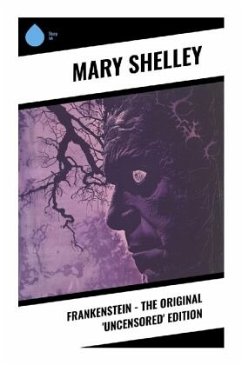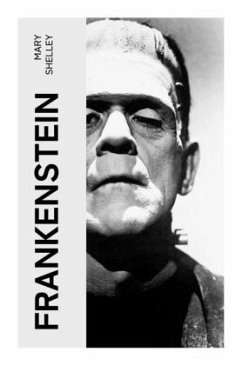
FRANKENSTEIN (The Original 1818 Edition)
Versandkostenfrei!
Versandfertig in 6-10 Tagen
11,20 €
inkl. MwSt.

PAYBACK Punkte
0 °P sammeln!
In "Frankenstein," Mary Shelley weaves a haunting tale that probes the depths of human ambition, morality, and the quest for knowledge. Written in the early 19th century, this seminal novel is considered a cornerstone of Gothic literature. Shelley's narrative, delivered through a series of letters and first-person accounts, embarks on a philosophical exploration of creation and responsibility as it follows Victor Frankenstein's disastrous obsession with animating life through scientific experimentation, ultimately leading to profound consequences on both creator and creature. Stylistically, th...
In "Frankenstein," Mary Shelley weaves a haunting tale that probes the depths of human ambition, morality, and the quest for knowledge. Written in the early 19th century, this seminal novel is considered a cornerstone of Gothic literature. Shelley's narrative, delivered through a series of letters and first-person accounts, embarks on a philosophical exploration of creation and responsibility as it follows Victor Frankenstein's disastrous obsession with animating life through scientific experimentation, ultimately leading to profound consequences on both creator and creature. Stylistically, the prose is rich, introspective, and laden with existential angst, reflecting the anxieties of the Romantic era regarding the limits of human endeavor and the relationship between mankind and the natural world. Mary Shelley, the daughter of feminist thinker Mary Wollstonecraft and political philosopher William Godwin, was deeply influenced by the intellectual currents of her time. Having witnessed personal tragedy and the tumult of the early 19th century, Shelley's insights into the human condition are informed by her own experiences of loss and societal constraints. "Frankenstein" emerged from discussions with notable figures like Percy Bysshe Shelley and Lord Byron during a summer spent in Geneva, where the idea of reanimating life was first conceived amid eerie storms and unsettling discussions. Readers intrigued by the moral dilemmas of scientific advancement and the darker facets of human nature will find "Frankenstein" to be an essential read. Shelley's exploration resonates across centuries, serving both as a cautionary tale and a profound inquiry into the consequences of our pursuits. This original 1818 edition beckons today's audience to reflect on the balance between enlightenment and hubris, making it a timeless literary masterpiece.












